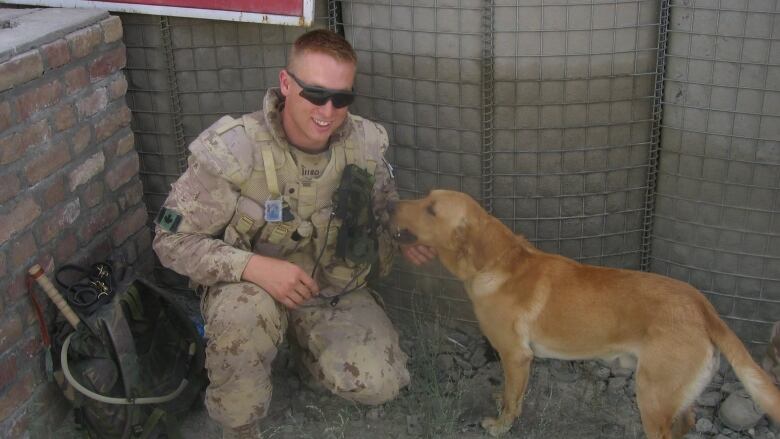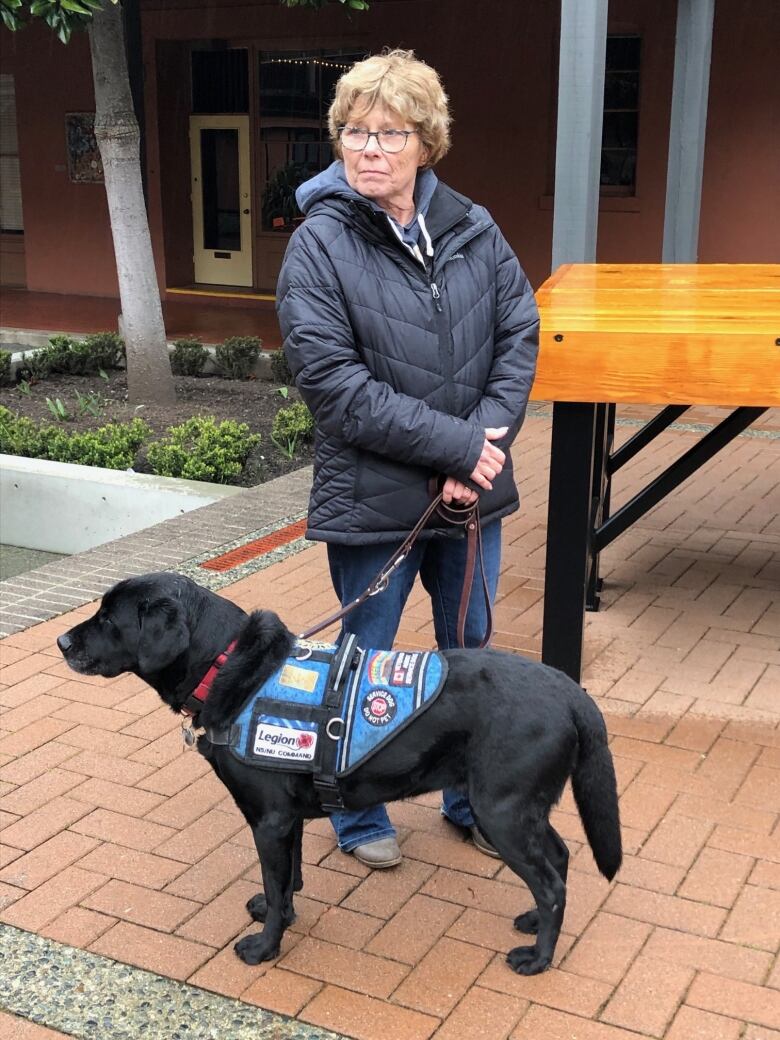'She gave me back part of my soul:' Pandemic border restrictions tie up service dog group
Paws Fur Thought normally matches up to 14 dogs with PTSD sufferers each year

Growing up, Jeff Wright's best friend was Rusty, the family's golden retriever.
He carried his love of dogs from his hometown in Haneytown, N.B., to Afghanistan, where he did two tours of duty as a weapons technician in the Canadian Armed Forces.
"Every chance I got, I was with the dog handlers," he said.
The dogs, trained to detect explosives, provided Wright with comfort and companionship during the most intense and stressful months of his nearly 17-year military service.
Wright is looking for that same kind of solace today, from a service dog.
PTSD, medical discharge
After his time in Afghanistan, Wright was diagnosed with post-traumatic stress disorder. Hereceived a medical discharge in 2018.
He has been approved to receive a service dog. But Wright and about two dozen others who are working with Paws Fur Thought a non-profit group based in Nova Scotia will have to wait until they can cross into the U.S. and come back.
Paws Fur Thought provides service dogs to military veterans and first responders with PTSD.
"I never got blown up," Wright said of his timeoverseas. "I never got injured physically, but we were rocketed, we were mortared, we were shot at."
Although he didn't receive physical injuries in Afghanistan, his deployment took a mental toll.
"I came back in 2007 and I was nothing like myself," he said. "I was very, very depressed. I was dark.
"I was up all hours of the night drinking, playing video games.I really receded into myself and pulled myself away from my wife."
Second tour
Despite his struggles after his first tour, he signed up for a second tour in Afghanistan in 2010, hopinghe could pull himself together.
"It was the only place that I felt normal," he said.
When he returned home to New Brunswick, things went from bad to worse. In 2019, he was hospitalized.
"I had a severe nervous breakdown," said Wright. "My father-in-law found me walking down the road at 11 o'clock at night with my slippers on, and I had no idea what was going on."

Kim Gingell's life spiralled, too, after her six-month deployment to Sierra Leone. She was one of roughly 90 Canadian soldiers posted to the West African nation to provide logistical support to United Nations peacekeepers in 2001.
Not long after she returned home, she began to struggle.
"I had a horrible, horrible drinking problem," said Gingell. "I couldn't go outside.I couldn't do anything unless I was drunk. I couldn't face reality."
She can now, thanks to her service dog, Omega.
"She sleeps with me, she wakes me from my dreams," said Gingell. "If I get triggered, she'll do her thing.
"She gave me back part of my soul."
'It saved her life, saved my family'
Her husband, Mike Gingell, is just as grateful that Kim has the black Labrador'shelp to manage her illness.
"It saved her life, saved my family," he said.
The two of them believe so strongly in the power of service dogsthey now managePaws Fur Thought. It provided Kim with Omega.
The groupwill pair from 10-14 people with dogs in a given year. But it didn't happen in 2020 and hasn't in 2021.
The group works with a Kansas-based service dog provider. Because ofborder restrictions, the group hasn't been able to send anyone south to train and be paired with a dog.
It has added stress for Wright, whose life still has its troubles.
"To have that golden carrot dangled and ripped away because of COVID is so hard on mental stability," he said. "We've been doing everything that we can to try and keep me stable. My doctorshave upped my meds, changed meds."
Wright has adopted bunnies and even bought a lizard to try to fill the void.
Unfortunately, his bearded dragon died last week.
Two dozen in line for dogs
Kim Gingell is just as upset. There are 24 people in line to be paired with a dog.
"It's very hard because I know what they're going through."
The Gingells are anxious for the border to reopen to regular traffic so they can send those waiting for a service dog to the U.S. for their training, and their dogs.
That's because they are convinced thevisit to Concordia, Kansas will change lives.
"If they opened [the border]tomorrow, boy, we'll be on the airplanes," said Kim Gingell.
Wright is eagerbecause he knows how comforting a dog can be for him. He learned thatin Afghanistan and is looking forward to the change a service dog will bring.
"Live. Be happy. Be able to go public."
MORE TOP STORIES












_(720p).jpg)


 OFFICIAL HD MUSIC VIDEO.jpg)
.jpg)



























































































